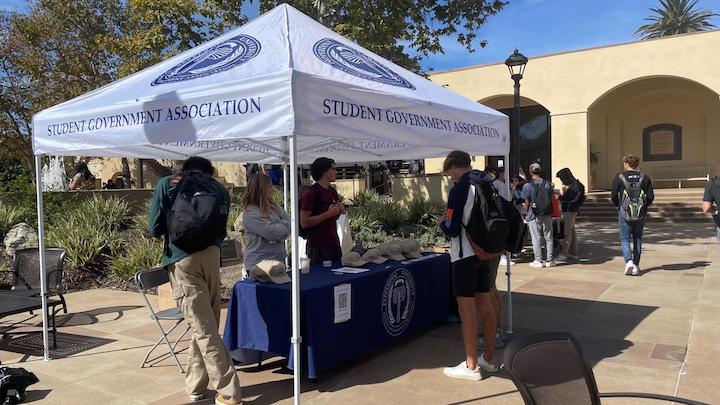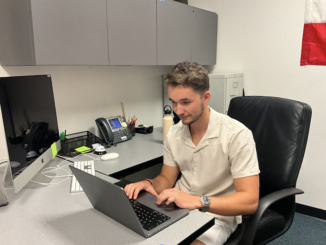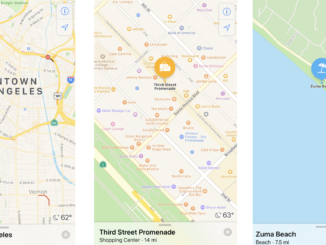
Free.
A college student’s favorite word.
“Attend the meeting for free snacks.” “Vote for class president for free Chick-fil-A.” “Follow the Instagram for a free tote bag.”
In a town as expensive as Malibu, the word ‘free” often wins over a broke college student struggling with overspending. Fortunately, there are many resources on Pepperdine’s campus that can help students with their budgeting needs and set them up for success after college.
“It really is just a lifelong learning process that should be empowering,” said Derek Stoutland, a private wealth adviser for Wells Fargo and a Pepperdine alumnus. “If you’re aware of where you are at and where you want to be, you can take baby steps over months and over years in order to reach that point and achieve the goals you have in life.”
Indirect college expenses such as transportation, dining and entertainment costs can cause overspending. Experts encouraged students to be intentional about how they spend their money.
Spending is different for everyone
Laura Ponder, a licensed certified public accountant, said it is suggested that on average a Pepperdine student should spend about $125 a month on personal expenses. This personal expense allowance does not include the Pepperdine meal plan or transportation costs.
“As noted in the cost of attendance the personal expenses are $1,500 per year that is recommended,” Ponder said. “If you calculate that out and divide it by 12 that’s only $125 a month.”
Some Pepperdine students exceed this amount in just a week.
Some students believe that living off campus can keep costs down, while others believe the opposite.
Alex Hobbs, a junior sport administration major, said she spends approximately $100 a week. Since she does not have a Pepperdine meal plan this includes her groceries.
“Because I live off-campus and being able to cook on my own it would probably be $100,” Hobbs said. “If I were to live on campus and then going out to get food outside of it, it would definitely be more.”
Contrary to Hobbs, Paige Fontes, a junior international business major, said she spends about $50 a week and living on campus helps with her budget.
“Since we have the meal points at Pepperdine it takes a big chunk of money that I would spend on food,” Fontes said.
Since some students choose to buy their own groceries and others prefer the meal plan at Pepperdine, one student’s spending habits can not be compared with others.
For other students, living independently from their parents has caused them to realize they may need help with their spending habits.
First-year economics major Gia Singhsaid coming from India she now has to learn to manage her own money.
“Handling my own money is new to me because I was in a boarding school,” Singh said. “I didn’t need to do that so now I need to learn how to do that.”

How to prevent overspending
Students who set intentions with their spending can put an end to their overspending habits, said Haley O’Steen, a finance professor and Wave Pool faculty adviser. Wave Pool is an investment club that aims to promote financial literacy to students at Pepperdine. O’Steen believes the easiest way to save money is to be methodical about where students spend.
“Just being really intentional about keeping track of what you do is really helpful,” O’Steen said.
Stoutland is a Pepperdine alumnus who created a financial literacy program on campus while working on his five-year MBA. Stoutland advises students to set their intentions based on what makes them happy and cut spending on things that do not.
“If you love fine dining, create a budget around that,” Stoutland said. “Say, ‘You know I’m going to go to a super nice restaurant once a month and allocate this amount of money on that because it really makes me happy.’”
Creating a budget allows students to spend money on things that they enjoy while not feeling guilty about overspending.
Joseph Sung, junior international business major, creates expense tracking budgets. His biggest tip to prevent overspending is putting aside a set amount for purchases, such as groceries.
“If you set aside a certain amount for groceries you can stick to what you need to get and you don’t suddenly pile up everything in your cart,” Sung said.
Different ways to budget
There are many ways students can practice budgeting. One way is to place a set amount of money in an envelope for each budget item to limit spending.
“What I’ve noticed is if I have actual cash on hand that’s much easier because I can actually physically see it going away,” Fontes said. “So I have noticed cash is the best way for me to manage my money and spending habits.”
However, technology is a part of every student’s daily life and can be very beneficial when it comes to budgeting.
“I know our students are so tech-savvy,” Ponder said. “I would recommend that they use technology to help them with their needs.”
O’Steen suggested students use apps and Excel to their advantage while budgeting.
“An easy way is to use Mint,” O’Steen said. “It’s an app that takes all of your accounts and kind of tracks where you spend and that really is only going to work for credit cards. But I have a lot of students also who just use a good old-fashioned Excel spreadsheet.”
Sung records all of his cash and card purchases in Excel in order to see his full spending log.
“I create this budget sheet and it’s been pretty helpful,” Sung said. “I wanted to be more responsible with my money and what I spent it on and I think just seeing all these numbers makes you think ‘Oh maybe I should spend a little less this time.’”
Resources for financial assistance
There are resources on campus that can help students get started with their budgeting needs. O’Steen said there are two parts to the Wave Pool club, investing and personal finance. She encourages students who need extra budgeting help to join.
“I would absolutely say get in touch with somebody at Wave Pool,” O’Steen said. “There are a ton of students who are well beyond their years with managing their money. If it’s as simple as how do I put together a budget they would be able to help you really well with that.”
Students can also seek aid through the finance courses offered at Pepperdine. Pepperdine offers an accounting and finance course called BA 220.
“They can learn about financing, budgeting, investments, stocks, bonds,” Ponder said.
Another course offered at Pepperdine is BA320, a personal finance class.
“Students can do a deeper dive into budgeting, investing, credit cards, different interest rates that would really be beneficial to them,” Ponder said. “I would highly recommend that students check out both courses.”
Learning how to manage money is a life-long learning process, Stoutland said. Students who put in the effort to learn to manage and budget their money now will be greatly benefited in the future.
“At the end of the day, you do have to recognize that money is just a part of everyone’s life whether you like it or not,” Stoutland said.
Sahana Patel completed the reporting for this story in Jour 241 in Fall 2021 under the supervision of Dr. Christina Littlefield and Dr. Theresa de los Santos. Dr. Littlefield supervised the web version of the story.




